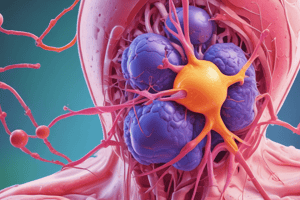Podcast
Questions and Answers
What determines the type and severity of the immune response in transplantation?
What determines the type and severity of the immune response in transplantation?
- Type of tissue transplanted
- ABO blood group system
- Location of the recipient's immune status
- Genetic disparity between the donor and recipient (correct)
Which system encodes for HLA proteins, which are recognized as foreign by the recipient immune system?
Which system encodes for HLA proteins, which are recognized as foreign by the recipient immune system?
- ABO blood group system
- Blood type antigens
- MHC (Major histocompatibility complex; HLA in humans) (correct)
- Immune privileged sites
Which type of graft involves grafting from one area to another in the same individual?
Which type of graft involves grafting from one area to another in the same individual?
- Xenograft
- Allograft
- Isograft
- Autograft (correct)
Why are transplanted organs at immune privileged sites generally accepted without significant immune reaction?
Why are transplanted organs at immune privileged sites generally accepted without significant immune reaction?
What determines the compatibility (or incompatibility) of transplanted tissue?
What determines the compatibility (or incompatibility) of transplanted tissue?
Flashcards
Transplant immune response determinant
Transplant immune response determinant
The degree of genetic difference between the donor and recipient determines the strength and nature of the immune response in transplantation.
MHC Role in Transplantation
MHC Role in Transplantation
The MHC encodes HLA proteins, which are displayed on cell surfaces and act as the primary targets for immune recognition in transplantation.
Autograft
Autograft
An autograft involves transplanting tissue from one location to another within the same individual.
Immune Privileged Transplant Sites
Immune Privileged Transplant Sites
Signup and view all the flashcards
Histocompatibility Antigens Role
Histocompatibility Antigens Role
Signup and view all the flashcards
Study Notes
Determinants of Immune Response in Transplantation
- The type and severity of the immune response in transplantation are determined by the degree of HLA mismatch between the donor and recipient
Role of HLA Proteins in Transplantation
- The major histocompatibility complex (MHC) system encodes for HLA proteins, which are recognized as foreign by the recipient immune system
Types of Grafts
- Autograft: involves grafting from one area to another in the same individual
- Other types of grafts: allograft, xenograft, and isograft
Immune Privileged Sites
- Transplanted organs at immune privileged sites (e.g. the eye, brain, and pregnant uterus) are generally accepted without significant immune reaction due to the local immune suppression mechanisms
Tissue Compatibility in Transplantation
- The compatibility (or incompatibility) of transplanted tissue is determined by the degree of HLA matching between the donor and recipient
- HLA matching is critical for successful transplantation, as it affects the risk of graft rejection and immunological complications
Studying That Suits You
Use AI to generate personalized quizzes and flashcards to suit your learning preferences.



